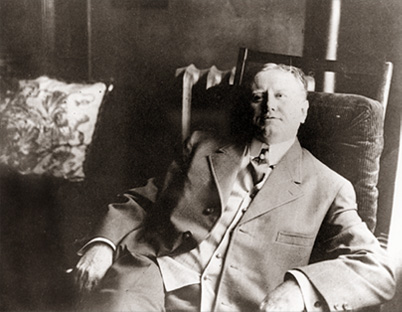11 Sept. 1862–5 June 1910

William Sydney (O. Henry) Porter, American author of short stories, was born in Greensboro of English and Dutch ancestry. He was the son of Algernon Sidney, a physician, and Mary Jane Virginia Swaim Porter. Porter's great-uncle, Jonathan Worth, was governor of North Carolina from 1865 to 1868. Born of a respectable middle-class stock, he was reared and educated by Miss Evelina Porter, his aunt. At age fifteen, he quit school and began work as a clerk and as a pharmacist's apprentice in his Uncle Clark's drugstore. For reasons of unsatisfactory health and unfavorable home conditions, he left for La Salle County, Tex., in 1882, where he identified with the robust life of ranching that was to give an atmosphere and flavor to some of his later writings.
Within two years, he was in Austin working as a book-keeper for a real estate firm. At the end of two years he accepted the position of assistant compiling draftsman for the General Land Office (January 1887–January 1891); later he became a paying and receiving teller in the First National Bank of Austin (1891–94). As a supplementary source of income during these years, he began writing free-lance sketches. Before resigning his position at the bank, he became editor and co-owner of a humorous weekly, The Rolling Stone. After its demise in 1895, he joined the Houston Daily Post staff as the columnist of "Some Postscripts," as a reporter, and as an occasional cartoonist.
In February 1896, after being indicted for the alleged embezzlement of bank funds during his employ as a teller at the First National Bank, he left Houston for Austin to stand trial. En route, he fled to New Orleans and later to Honduras. News of his wife's terminal illness in 1897 prompted his immediate return to Austin. His trial was postponed until after her death on 25 July 1897. The following February he was tried, convicted, and sentenced to imprisonment in the Ohio Penitentiary at Columbus for five years. He entered the prison on 25 Apr. 1898 and was released, after three years and three months for good behavior, on 24 July 1901. During his confinement, his jobs as a night druggist in the prison hospital and later as a secretary to the steward offered him spare time for writing. While in prison, his first short story, "The Miracle of Lava Canyon," was published by S. S. McClure and Company of New York on 18 Sept. 1898. For this and the stories that followed, he used such pen names as Oliver Henry, S. H. Peters, James L. Bliss, T. B. Dowd, and Howard Clark to conceal his identity. But upon release from prison, William Sydney Porter chose to emerge as O. Henry.
With confidence in himself as a writer, he arrived in New York during the spring of 1902. His chief quest was to obtain first-hand material of the city for his short stories, but it was not until 1904 that his stories were to reflect in a marked degree his new environment. The intervening tales continued to deal with the West or Southwest as well as Central or South America. His first book, Cabbages and Kings (1904), was a collection of stories that revealed a first-hand acquaintance with coastal Latin America. During his most prolific period (1904–5), he published a total of 115 short stories. All but 21 appeared in the columns of the New York World, and all but 16 dealt in some manner with New York City. With the publication of his second book, The Four Million (1906), he was hailed as the discoverer of romance in the streets of New York. Like most of his stories, the tales in this collection deal with the commonplace and arrive at a surprise ending through sheer coincidence. Each succeeding year until 1911 was marked by the publication of two collections of his stories. Heart of the West (1907) presented a fascinating collection of 19 stories about the West and the Texas range. The Trimmed Lamp (1907) established his right to be called the knight of the shop girl. Following these came The Voice of the City and The Gentle Grafter (1908), Roads of Destiny and Options (1909), and Strictly Business and Whirligigs (1910). Strictly Business contains "A Municipal Report," the last story published before his death. Whirligigs, published posthumously, contains "The Ransom of Red Chief," perhaps his funniest story. Later posthumous volumes included Sixes and Sevens (1911), Rolling Stones (1912), Waifs and Strays (1917), O. Henryana (1920), and O. Henry Encore (1936). Sixes and Sevens contains his last complete work, "Let Me Feel Your Pulse," which is the most autobiographical. In the O. Henry Encore, a collection of his Houston Post sketches, are to be found his two favorite motifs: the situation of the impostor or wearer of a disguise, and the idea of fate as the one unavoidable reality of life.
Porter died of diabetes and cirrhosis of the liver in the Polyclinic Hospital in New York. Interment followed on 7 June in Asheville. He was married twice: on 5 July 1887 to Athol Estes and on 27 Nov. 1907 to Sara Coleman of Asheville. Athol bore him one daughter, Margaret Worth, in 1889. As a tribute to Porter's contributions to American literature, the Society of Arts and Letters, in 1918, founded the O. Henry Memorial Award to be awarded annually to the author of the best American short story.